In today's rapidly evolving marketing landscape, understanding where to allocate your resources can be a daunting task. With multiple channels vying for attention—from social media ads to email campaigns—marketers often struggle to accurately measure the return on investment (ROI) for their efforts. A staggering 65% of marketers report difficulty in this area, indicating a significant gap in effective performance analytics. As a result, the need for attribution marketing tools has never been greater. These tools help marketers make sense of their data, offering insights into which channels and campaigns are truly driving conversions.
The global market for attribution modeling tools is projected to grow at a compound annual growth rate (CAGR) of 20.4% through 2028, reflecting the increasing demand for solutions that provide clarity in marketing effectiveness. In this article, we'll explore ten of the top attribution marketing tools available today, each designed to empower marketers with actionable insights and improve overall campaign performance.
Understanding attribution is a fundamental aspect of evaluating the effectiveness of marketing campaigns, especially in today’s multifaceted digital landscape. As businesses increasingly adopt multi-channel marketing strategies, they face the challenge of accurately measuring the impact of each channel on their overall performance. Traditional metrics, which often emphasize last-click attribution, can be misleading because they don't consider the entire customer journey. This limited view can result in misallocated marketing budgets, where undue emphasis is placed on the final touchpoint rather than recognizing the cumulative influence of all interactions.
For example, consider a company that invests heavily in pay-per-click (PPC) advertising, believing it to be their most effective channel based solely on last-click attribution data. While PPC might drive the final conversions, this approach overlooks the role of other channels, such as social media and email marketing, that may have initially engaged the audience, nurtured interest, or influenced brand perception. By focusing only on the last interaction, the company risks ignoring these significant contributors to its sales funnel, potentially leading to missed opportunities for optimization and growth.
Implementing robust attribution marketing tools is essential for businesses to navigate this complexity. These tools offer advanced analytics and insights by examining the entire customer journey across all touchpoints. They help identify which channels are genuinely influential in driving conversions and how they interact with one another. For instance, an attribution tool might reveal that while social media channels don't often capture the final click, they play a critical role in awareness and engagement stages, leading to conversions through other means. This understanding allows marketers to make informed decisions about budget allocation, ensuring resources are directed towards channels that contribute most effectively to their goals.
Let's delve deeper into a real-world example. A retail brand initially allocated 30% of its marketing budget to online display ads, based on the assumption that these ads were the primary drivers of sales. However, after implementing an advanced attribution tool, the brand discovered that while display ads generated high impressions, another channel—such as influencer partnerships—was significantly more effective at converting interest into sales. Influencers were creating authentic content that resonated with the audience, leading to higher brand trust and quicker purchasing decisions. This newfound insight prompted the brand to reallocate their budget, decreasing spend on display ads while increasing investment in influencer marketing. As a result, the company not only improved its return on investment (ROI) but also enhanced its customer acquisition strategy by leveraging more impactful channels.
This example underscores the importance of attribution in marketing strategy. Accurate attribution not only clarifies which channels deserve more focus but also aids in understanding the intricate interplay between different touchpoints. This comprehensive view supports smarter decision-making and optimization of marketing efforts. Moreover, it provides a clearer picture of customer behavior and preferences, enabling businesses to tailor their messaging and offerings to better meet consumer needs.
Furthermore, attribution tools facilitate the creation of custom attribution models tailored to specific business needs. For example, a business might choose to implement a linear attribution model that evenly distributes credit across all touchpoints, thereby recognizing the contribution of each interaction. Alternatively, they might opt for a time-decay model, which assigns more weight to interactions closer to the conversion event. These customizable models provide businesses with the flexibility to analyze their data in ways that reflect their unique marketing dynamics and objectives.
In conclusion, understanding and implementing effective attribution strategies can transform a company's marketing approach. By leveraging sophisticated attribution tools, businesses can gain a nuanced understanding of their marketing performance, leading to more strategic budget allocations and more effective campaigns. As the digital marketing landscape continues to evolve, the ability to accurately measure and attribute the impact of various channels will be crucial for achieving sustained growth and competitive advantage. For marketers, embracing these tools is not just an option but a necessity in the quest for precision and efficiency in their campaigns.
Cometly is ideal for businesses seeking extensive web analytics and precise conversion tracking, Cometly offers a robust solution that caters to organizations of all sizes. With its cutting-edge machine learning algorithms, Cometly transforms complex datasets into actionable insights, elevating your marketing strategy to new heights.
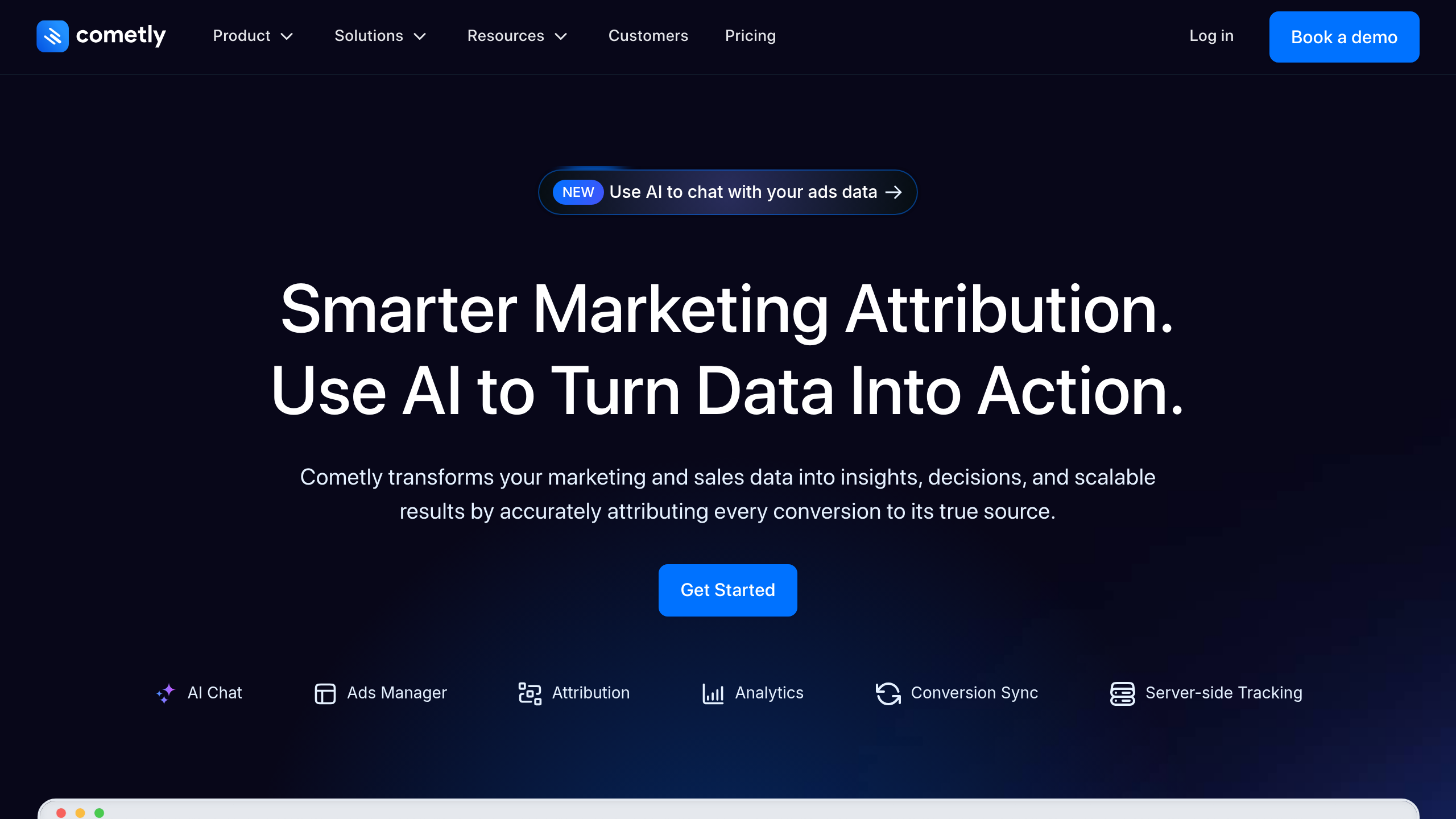
1. Comprehensive Event Tracking: Cometly provides a detailed view of user interactions, enabling marketers to trace how specific actions drive conversions. This granular tracking is essential for optimizing marketing efforts.
2. Customizable Reporting: With its flexible reporting features, Cometly allows users to zero in on the metrics that are most critical to their business success, ensuring that decisions are data-driven and informed.
3. Predictive Insights: By harnessing the power of machine learning, Cometly offers predictive analytics that help businesses foresee consumer behavior trends, allowing for proactive strategy adjustments.
This tool is perfect for businesses of any size looking to centralize their marketing analytics. Whether you’re a burgeoning startup or a well-established enterprise, Cometly equips you with the insights needed to enhance efficiency and foster growth.
Pros: Offers comprehensive data tracking and impressive predictive insights, and is accessible for most features without cost.
Cons: Some users may find it initially challenging, particularly beginners, due to its advanced functionalities.
For those interested in enhancing their data visualization capabilities, exploring marketing dashboard tools can provide additional insights into optimizing your marketing strategies.
For more on optimizing paid ads through data, check out our guide on paid ads analytics.
Best for: Integrated marketing automation for inbound marketing strategies.
HubSpot Marketing Hub offers a comprehensive suite of tools aimed at improving inbound marketing efforts. This platform integrates various marketing channels into a single dashboard, providing marketers with a holistic view of their campaigns.
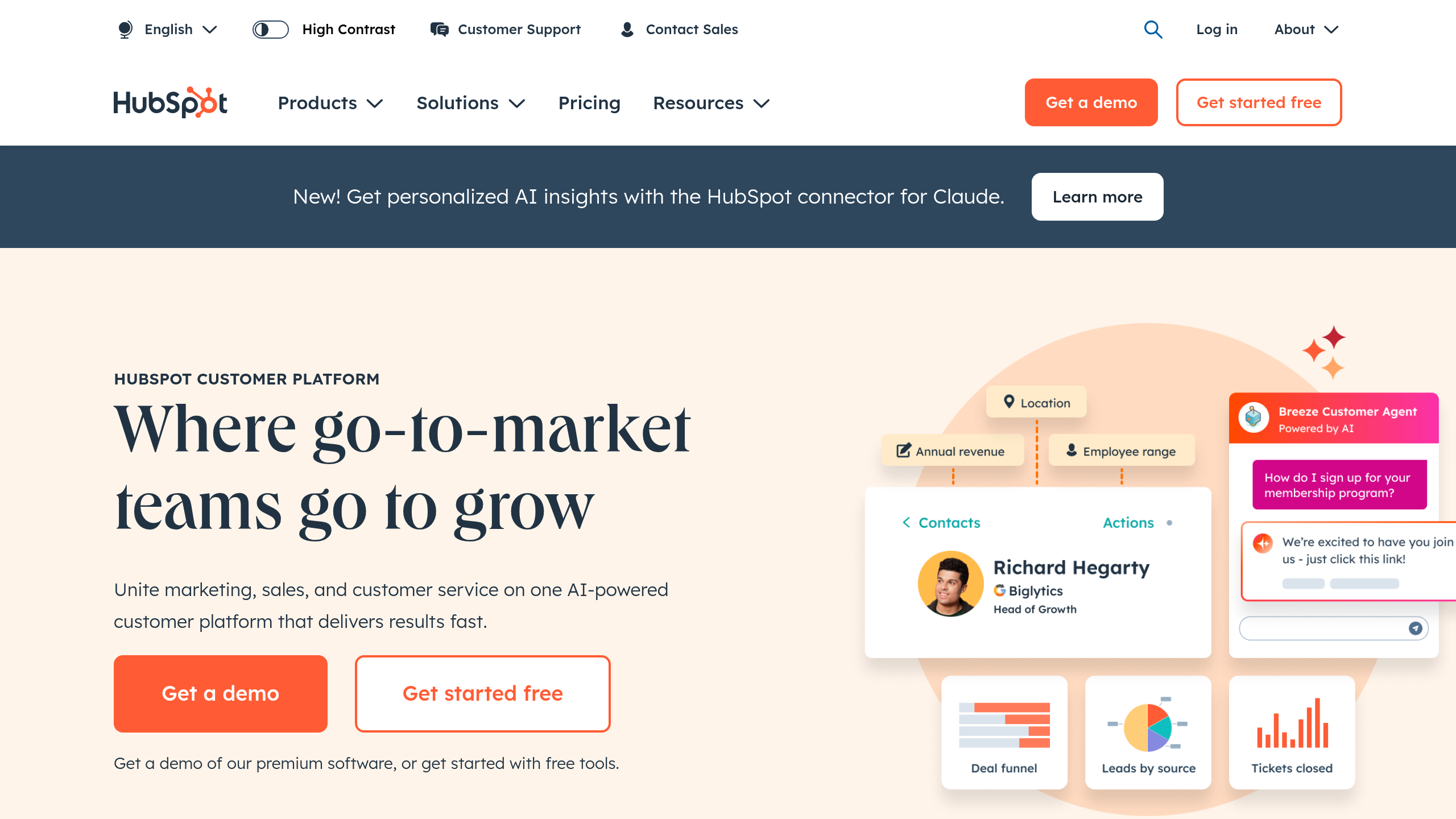
1. Unified Marketing Dashboard: HubSpot consolidates all marketing activities, allowing for easy monitoring and management.
2. Lead Nurturing: Advanced tools for email marketing and lead management help nurture prospects through the sales funnel.
3. Analytics and Reporting: Offers in-depth reporting on campaign performance, aiding in strategic decision-making.
Ideal for small to medium-sized businesses that prioritize inbound marketing and want to leverage a single platform for various marketing activities.
Pros: User-friendly interface, robust features for inbound marketing, excellent customer support.
Cons: Can become costly as you scale, some features require a learning curve.
To understand common ad attribution models, read our article on the 5 most common ad attribution models.
Best for: Advanced analytics solutions for enterprises with a focus on deep data insights.
Adobe Analytics provides sophisticated analytics solutions that help businesses make data-driven decisions. With its robust capabilities, it caters particularly well to large organizations with complex marketing needs.
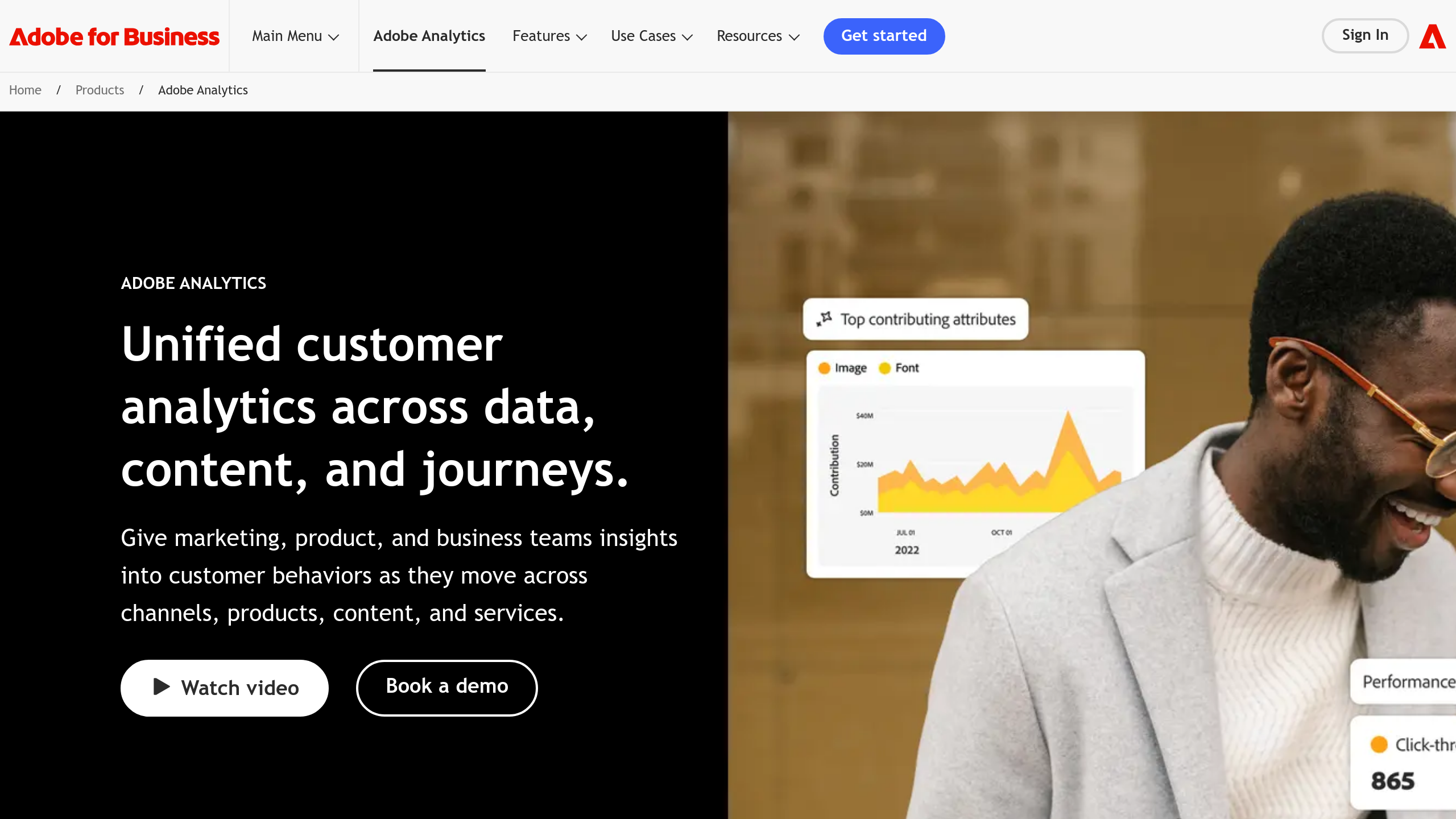
1. Real-Time Data Processing: Adobe Analytics offers real-time tracking of user interactions, allowing for immediate insights and adjustments.
2. Custom Attribution Models: Users can create custom attribution models that fit their unique business needs, providing flexibility and accuracy.
3. Advanced Segmentation: This feature allows marketers to drill down into specific audience segments for more tailored marketing strategies.
This tool is best suited for large enterprises that require comprehensive data analytics and have the resources to navigate its complex features.
Pros: Powerful analytics capabilities, customizable reporting, highly scalable.
Cons: Expensive, steep learning curve, may require dedicated data analysts.
Discover how to improve your attribution strategies with insights from our article on conversion sync.
Best for: Cross-channel attribution for brands looking for a unified view of marketing performance.
Attribution focuses on providing marketers with insights into how different channels contribute to conversions. This tool is specifically designed to help brands measure the effectiveness of their multi-channel marketing strategies.
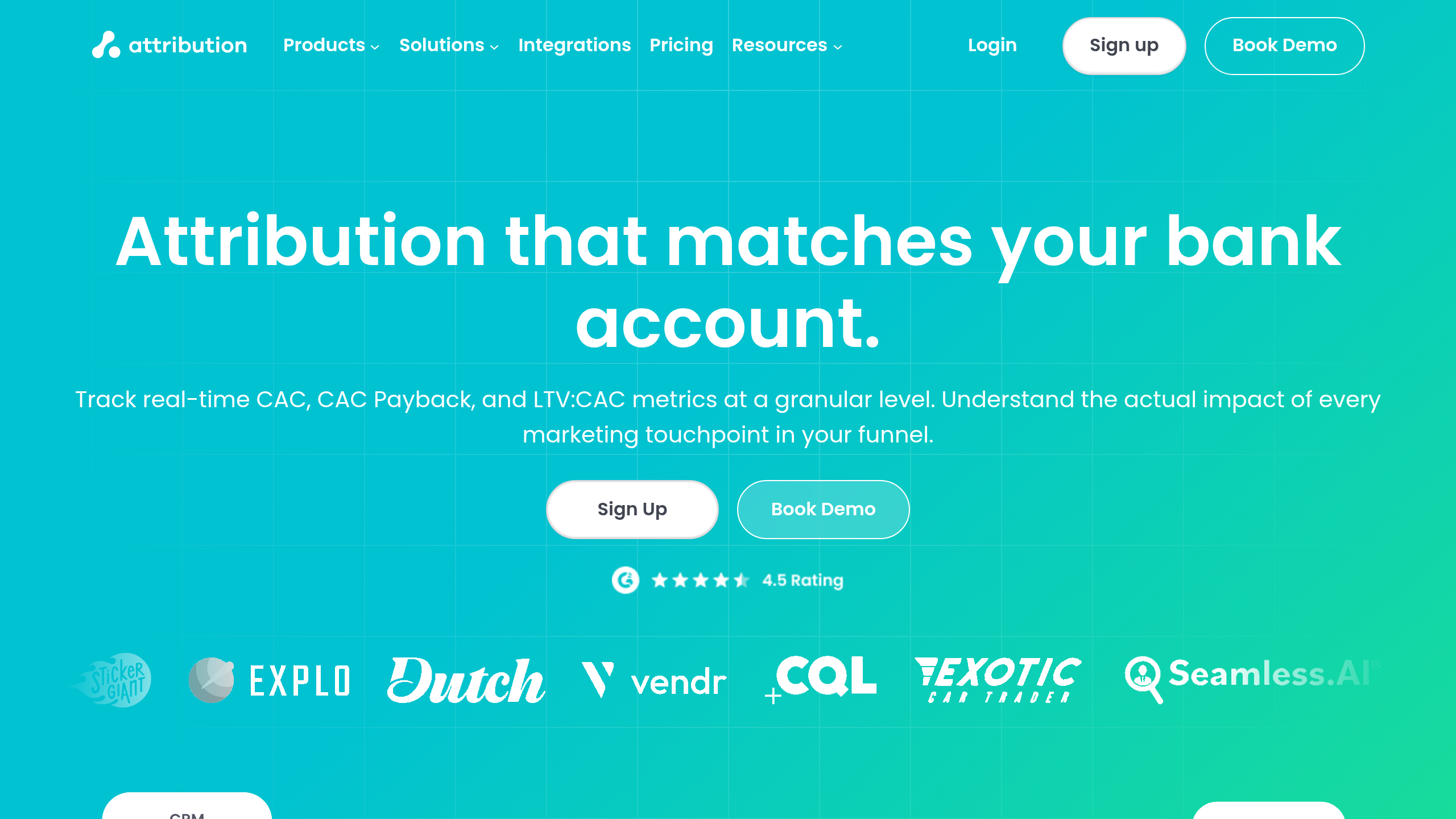
1. Multi-Channel Tracking: Tracks user interactions across various channels, providing a complete view of customer journeys.
2. Customizable Attribution Models: Users can create tailored attribution models to better reflect their unique marketing strategies.
3. Performance Insights: Offers in-depth analytics to uncover which channels deliver the best results.
Attribution is ideal for brands that utilize multiple marketing channels and want a clear understanding of how each contributes to sales.
Pros: Clear insights into multi-channel performance, customizable features, user-friendly interface.
Cons: Pricing can be high for smaller businesses, some users report data discrepancies.
Learn more about effective lead attribution models with our article on lead attribution model.
Best for: Product analytics and user engagement tracking.
Mixpanel specializes in product analytics, helping businesses understand user behavior and engagement over time. It provides actionable insights that can guide product development and marketing strategies.
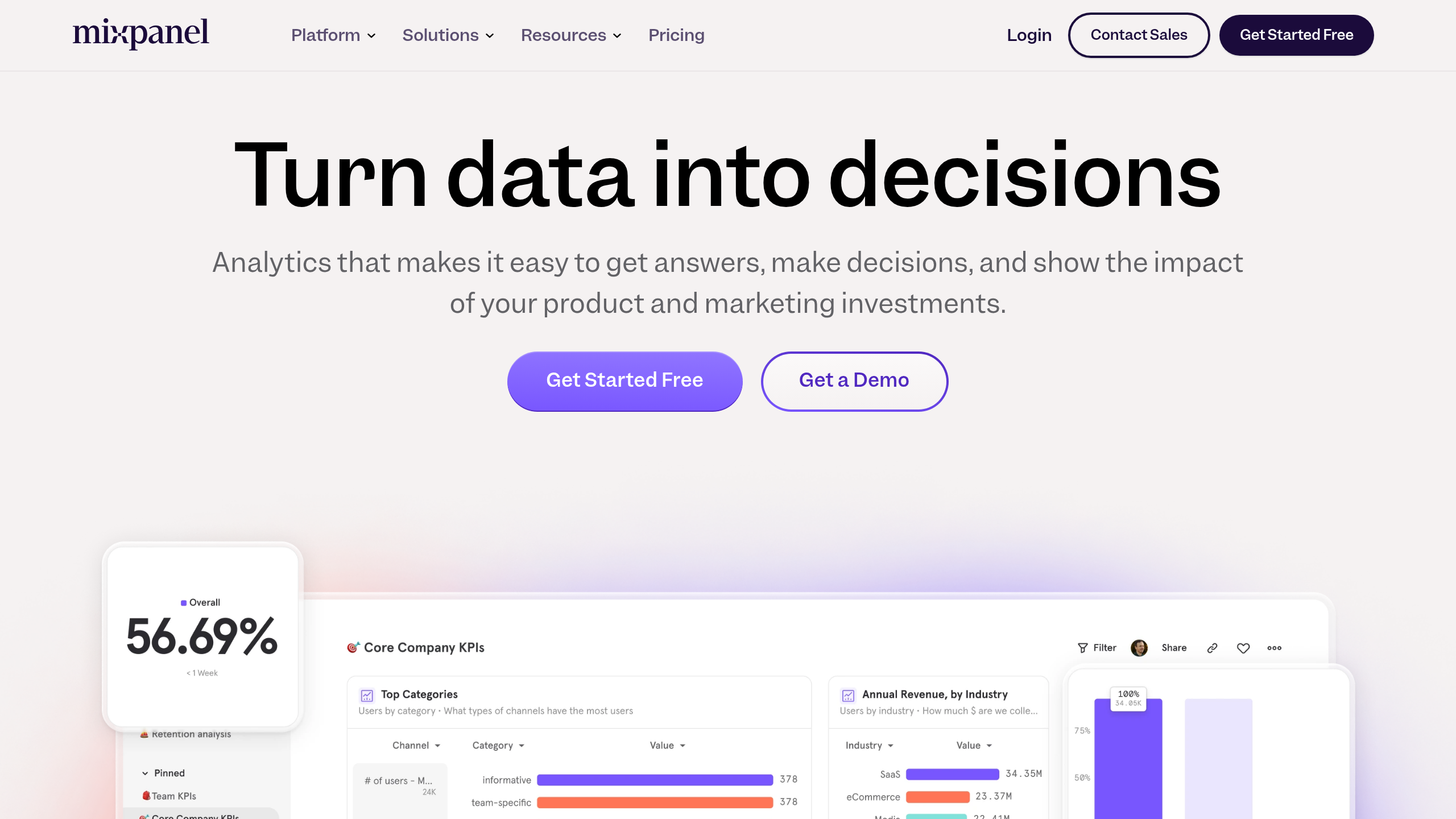
1. User Engagement Tracking: Mixpanel allows users to track how customers engage with their products across various platforms.
2. Cohort Analysis: This feature helps marketers analyze user behavior over time, providing insights into retention and engagement.
3. A/B Testing: Users can easily run experiments to determine the effectiveness of different marketing strategies.
Best suited for tech companies and startups focused on product development who need insights into user engagement.
Pros: Strong focus on user behavior, excellent cohort analysis capabilities, intuitive interface.
Cons: Can be expensive for extensive features, limits on data storage for free tiers.
To learn about estimated action rates and their importance, check our guide on what is estimated action rate.
Best for: Data collection and visualization across multiple marketing channels.
Funnel.io is a powerful data collection tool that integrates with various marketing platforms to provide a holistic view of marketing performance. It automates data gathering and visualization, saving time and resources.
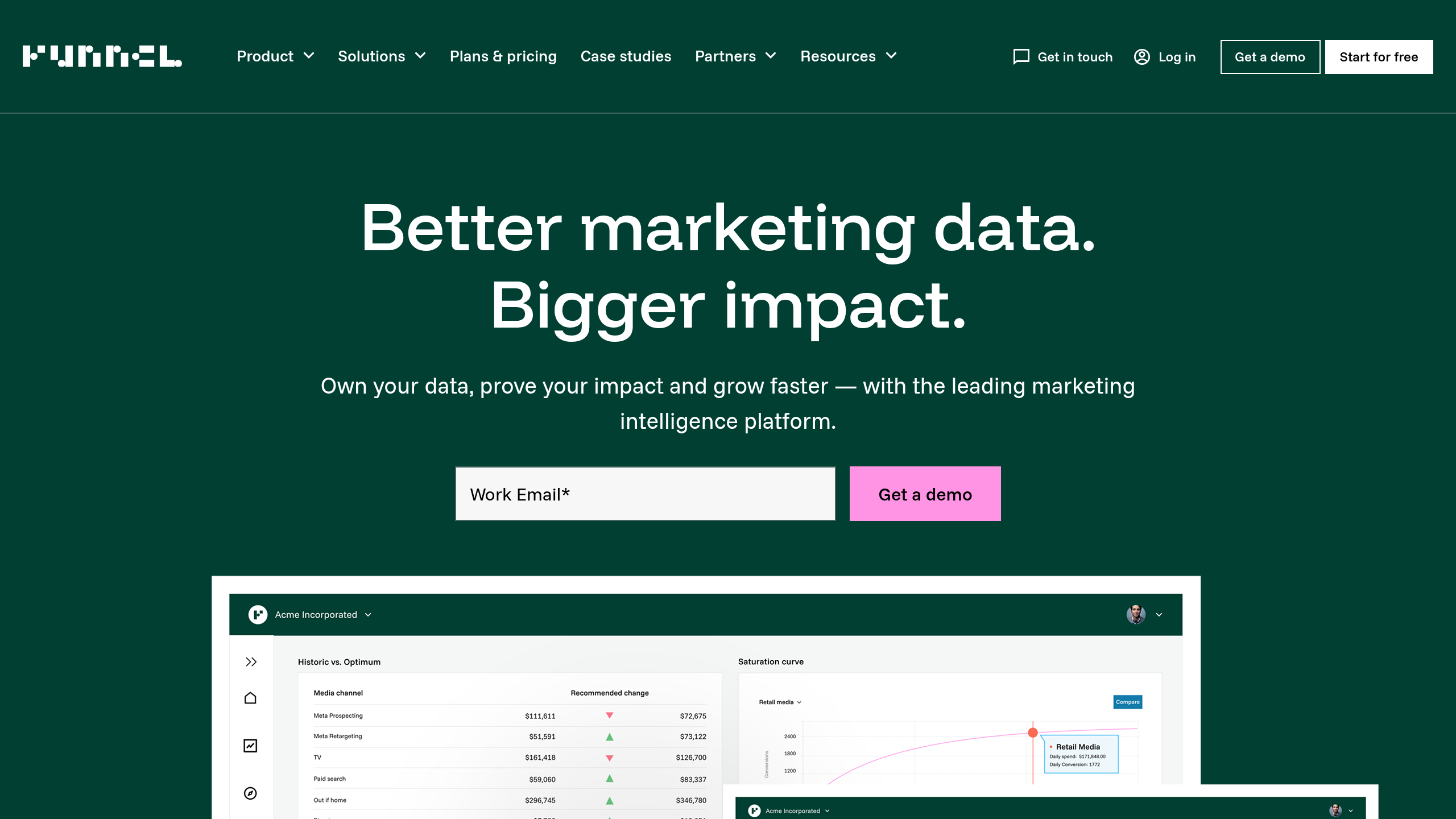
1. Automatic Data Integration: Easily pulls data from multiple sources, ensuring you have up-to-date insights.
2. Custom Dashboards: Users can create tailored dashboards that reflect the metrics that matter most to their strategy.
3. Reporting Automation: Funnel.io automates reporting processes, allowing marketers to focus on analysis rather than data collection.
This tool is ideal for marketers looking for an efficient way to gather and visualize data across various platforms.
Pros: Saves time on data collection, easy integration, customizable reports.
Cons: May require upfront investment, some users find the interface complicated.
Explore examples of effective marketing dashboards in our article on marketing dashboard examples.
Best for: E-commerce businesses looking to track customer behavior and conversion pathways.
Kissmetrics is a robust analytics tool designed specifically for e-commerce businesses. It focuses on tracking customer behavior and helps marketers understand which marketing efforts lead to sales.
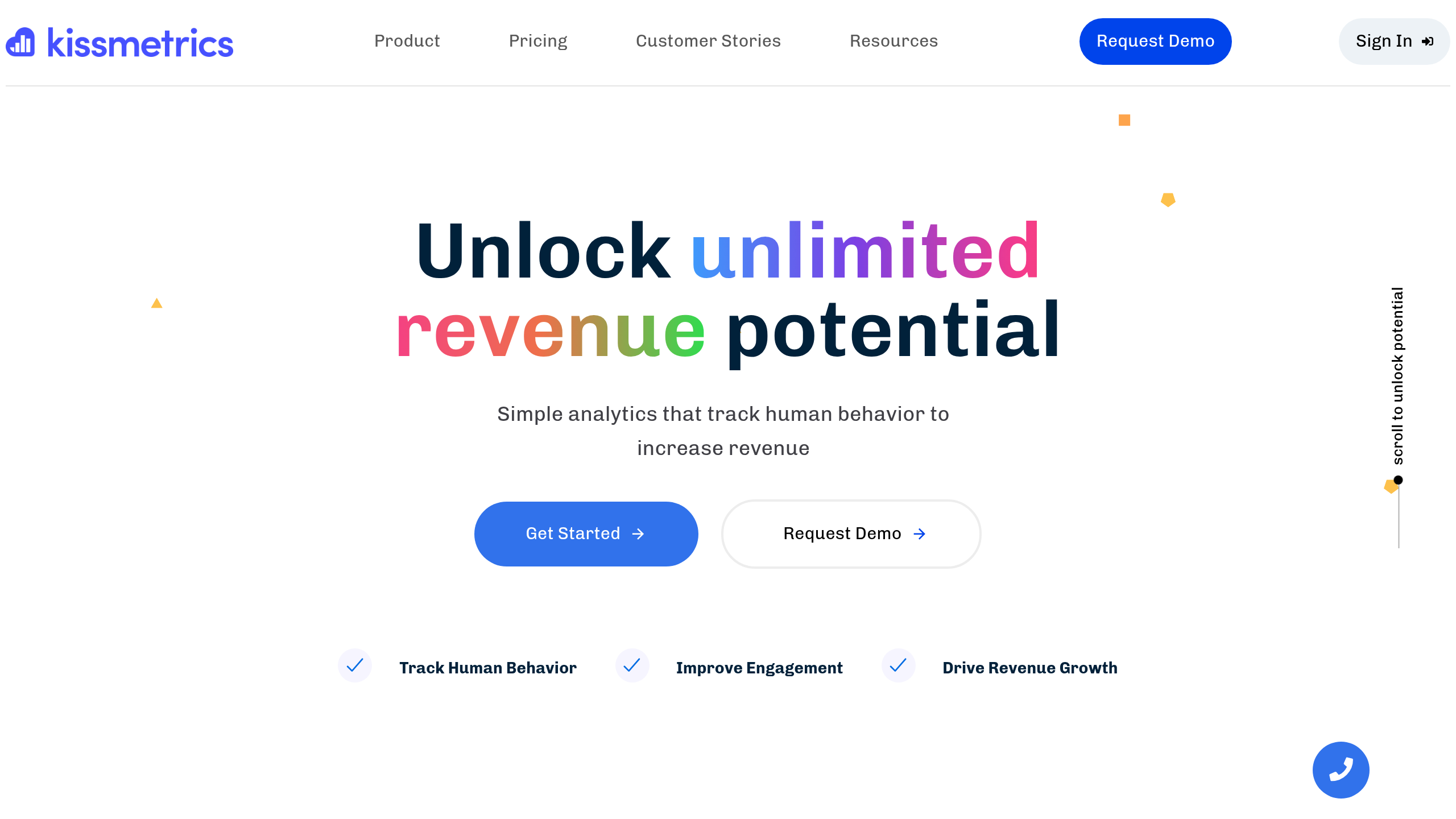
1. Funnel Reports: Kissmetrics provides visual representations of the customer journey, highlighting conversion bottlenecks.
2. Customer Segmentation: This feature allows businesses to group customers based on behavior, improving targeting efforts.
3. A/B Testing: Users can test different marketing messages to see what resonates best with their audience.
Kissmetrics is best for e-commerce businesses focused on detailed customer analytics and conversion tracking.
Pros: Comprehensive funnel analysis, strong focus on customer behavior, user-friendly interface.
Cons: Limited features in lower pricing tiers, manual setup for some reports.
To improve your understanding of sales conversion rates, check out our article on sales conversion rate. For insights on effective B2B analytics, explore our article on B2B analytics.
Best for: Data visualization and business intelligence analytics.
Tableau offers powerful data visualization capabilities that help businesses understand their marketing data more effectively. It allows users to create interactive dashboards that facilitate data-driven decision-making.
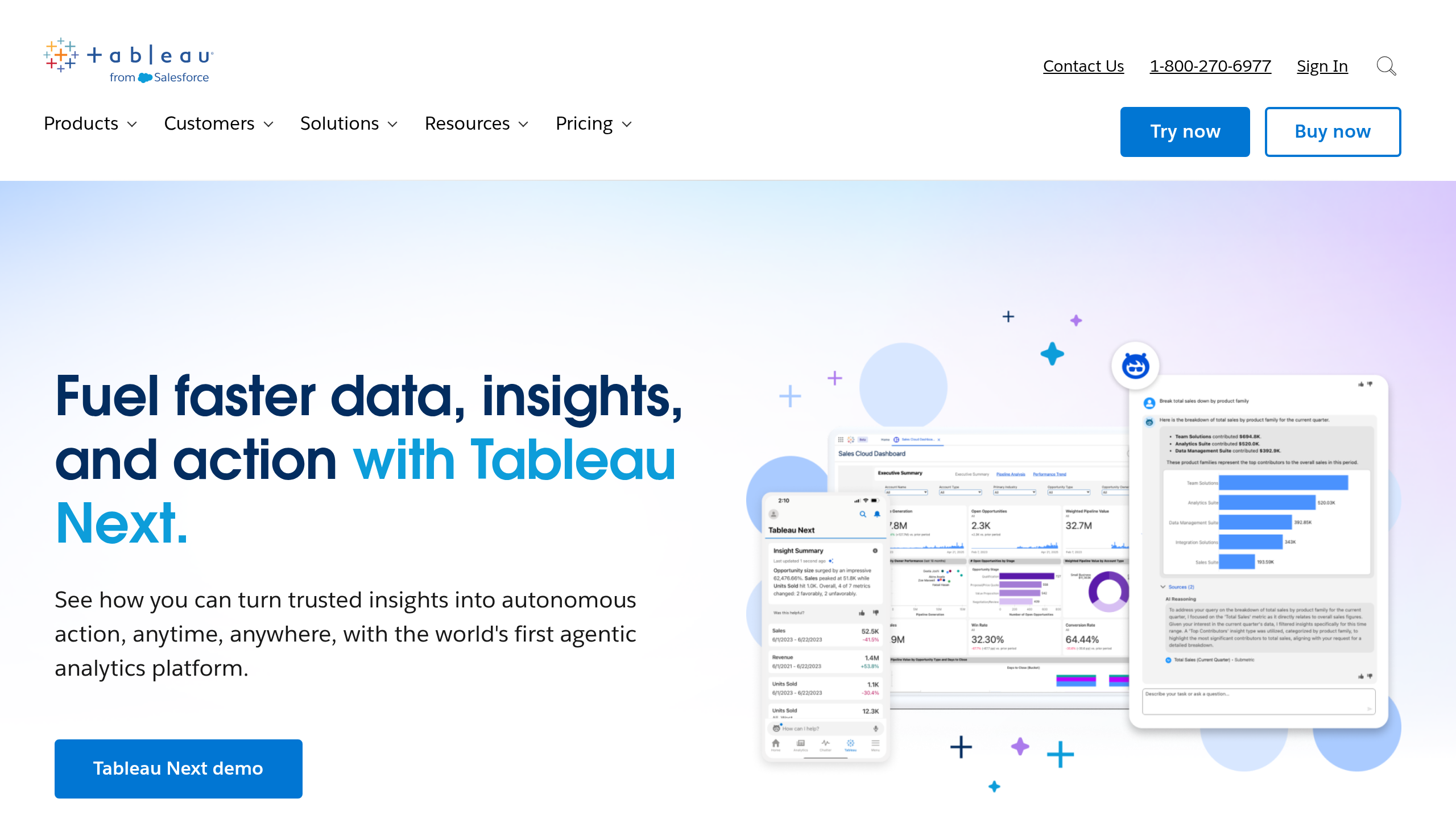
1. Interactive Dashboards: Allows users to create engaging dashboards that provide insights into marketing performance.
2. Visual Analytics: Helps businesses visualize complex data sets, making analysis more accessible.
3. Data Collaboration: Enables teams to collaborate on data insights, improving communication and strategy alignment.
Tableau is best suited for organizations that value data visualization and require robust analytical capabilities.
Pros: Highly customizable, strong visualization capabilities, excellent community support.
Cons: Can be expensive, requires training to use effectively.
For deeper insights into lead generation for B2B SaaS, read our article on lead generation for B2B SaaS.
Best for: Real-time analytics for content-driven marketing strategies.
Chartbeat specializes in real-time analytics designed for content publishers. It provides insights into audience engagement and content performance, allowing marketers to adjust strategies on the fly.
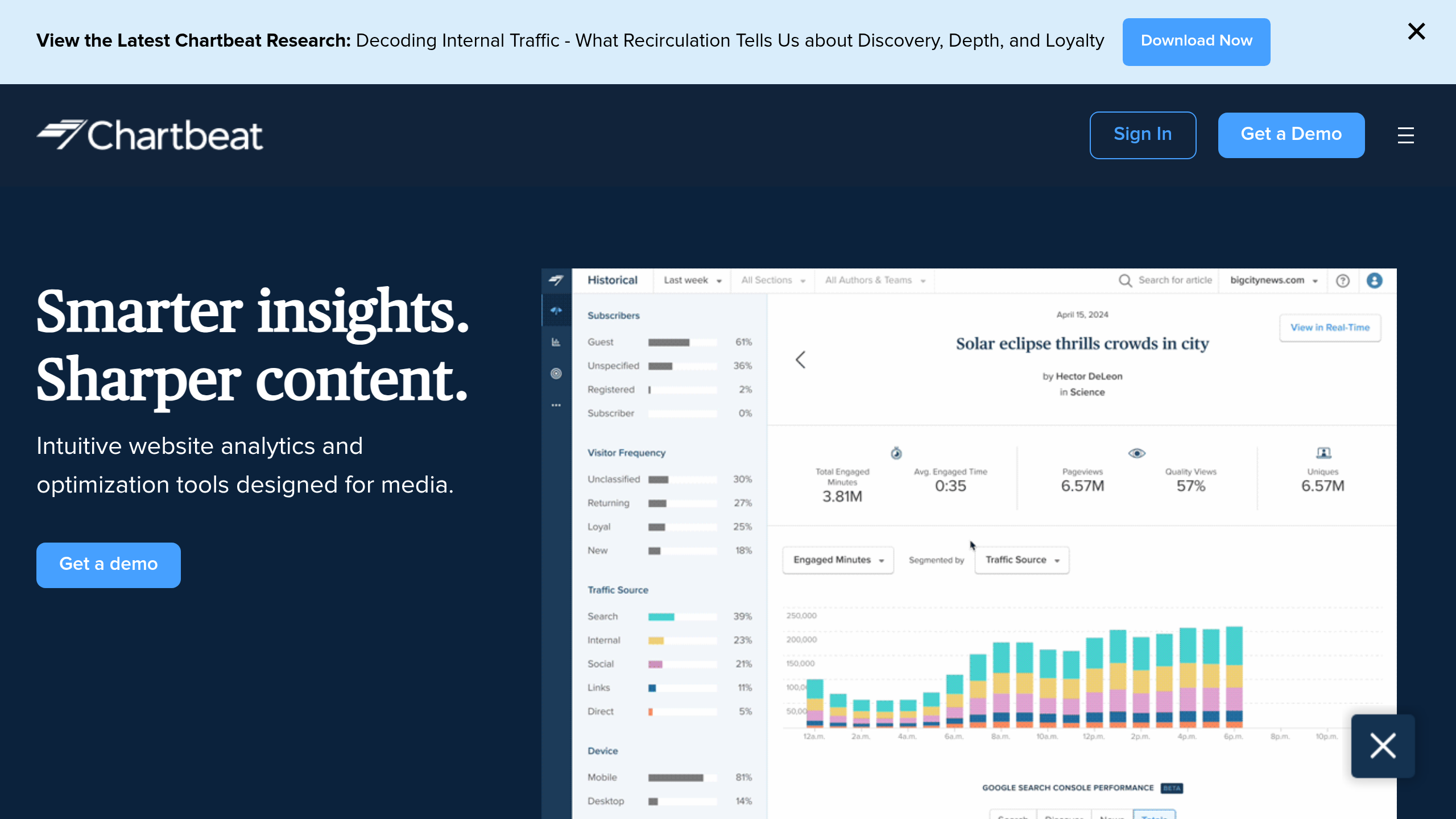
1. Real-Time Engagement Tracking: Chartbeat allows teams to see how content is performing in real-time, optimizing marketing efforts.
2. Audience Insights: Provides detailed analytics on audience behavior and preferences, guiding content strategy.
3. Content Optimization: Helps marketers understand which pieces of content are resonating with their audience, enabling smarter content planning.
This tool is ideal for digital publishers and content marketers looking to maximize audience engagement and content performance.
Pros: Real-time insights, strong focus on content performance, easy to use.
Cons: Limited features outside of content analytics, not ideal for e-commerce metrics.
Explore revenue analytics and its significance in marketing with our article on revenue analytics.
Choosing the right attribution marketing tool can significantly impact your marketing outcomes. Google Analytics 4 excels at providing comprehensive web analytics, while HubSpot Marketing Hub integrates inbound marketing strategies seamlessly. Adobe Analytics stands out for enterprises needing deep data insights, whereas Attribution focuses on cross-channel performance. Mixpanel offers great user engagement tracking for tech startups, and Funnel.io automates data collection for efficient reporting. Kissmetrics delivers powerful insights for e-commerce businesses, Segment leads in data integration for personalized marketing, Tableau excels at data visualization, and Chartbeat provides real-time analytics for content-driven strategies.
As you navigate your options, consider your business’s specific needs, budget, and the level of complexity you're prepared to manage. Armed with the right tools, you can unlock the full potential of your marketing strategies and drive meaningful results.
When it comes to selecting an attribution marketing tool that truly stands out, Cometly emerges as a frontrunner. Its ability to transform complex datasets into actionable insights through cutting-edge machine learning algorithms is unparalleled. Cometly's strength lies in its comprehensive event tracking, which provides marketers with a granular view of user interactions. This level of detail is crucial for optimizing marketing efforts and ensuring that resources are allocated efficiently.
One of the significant advantages of using Cometly is its customizable reporting features. These allow marketers to focus on the metrics that are most critical to their success, ensuring that decisions are made based on solid data rather than intuition. Moreover, Cometly's predictive insights offer a competitive edge by allowing businesses to anticipate consumer behavior trends, facilitating proactive strategy adjustments that can lead to improved campaign performance.
Cometly also excels in accessibility, catering to businesses of all sizes—from startups to large enterprises. This versatility makes it a valuable tool for any organization looking to centralize their marketing analytics and maximize their ROI. While some users may initially find its advanced functionalities challenging, the platform's robust support and resources make it easier to overcome the learning curve.
In an era where data-driven decision-making is crucial, Cometly provides the insights needed to elevate marketing strategies to new heights. For businesses eager to enhance their campaign performance through precise conversion tracking and extensive web analytics, Cometly is undoubtedly the best choice. To get started with Cometly and revolutionize your marketing approach, Get Started Here.
Ready to elevate your marketing efforts? Start exploring these tools today and take your attribution strategy to the next level!
Learn how Cometly can help you pinpoint channels driving revenue.
.svg)
Network with the top performance marketers in the industry